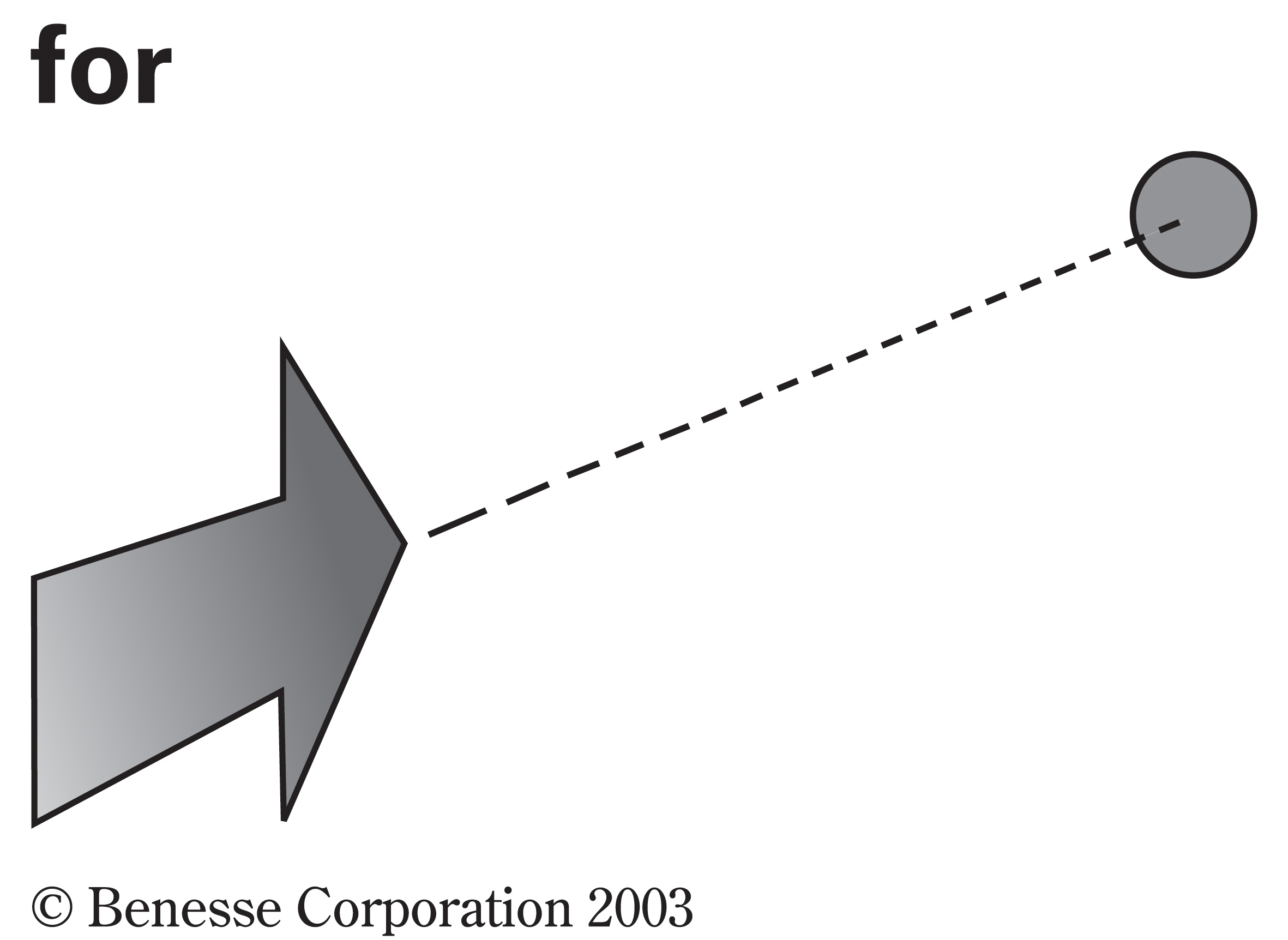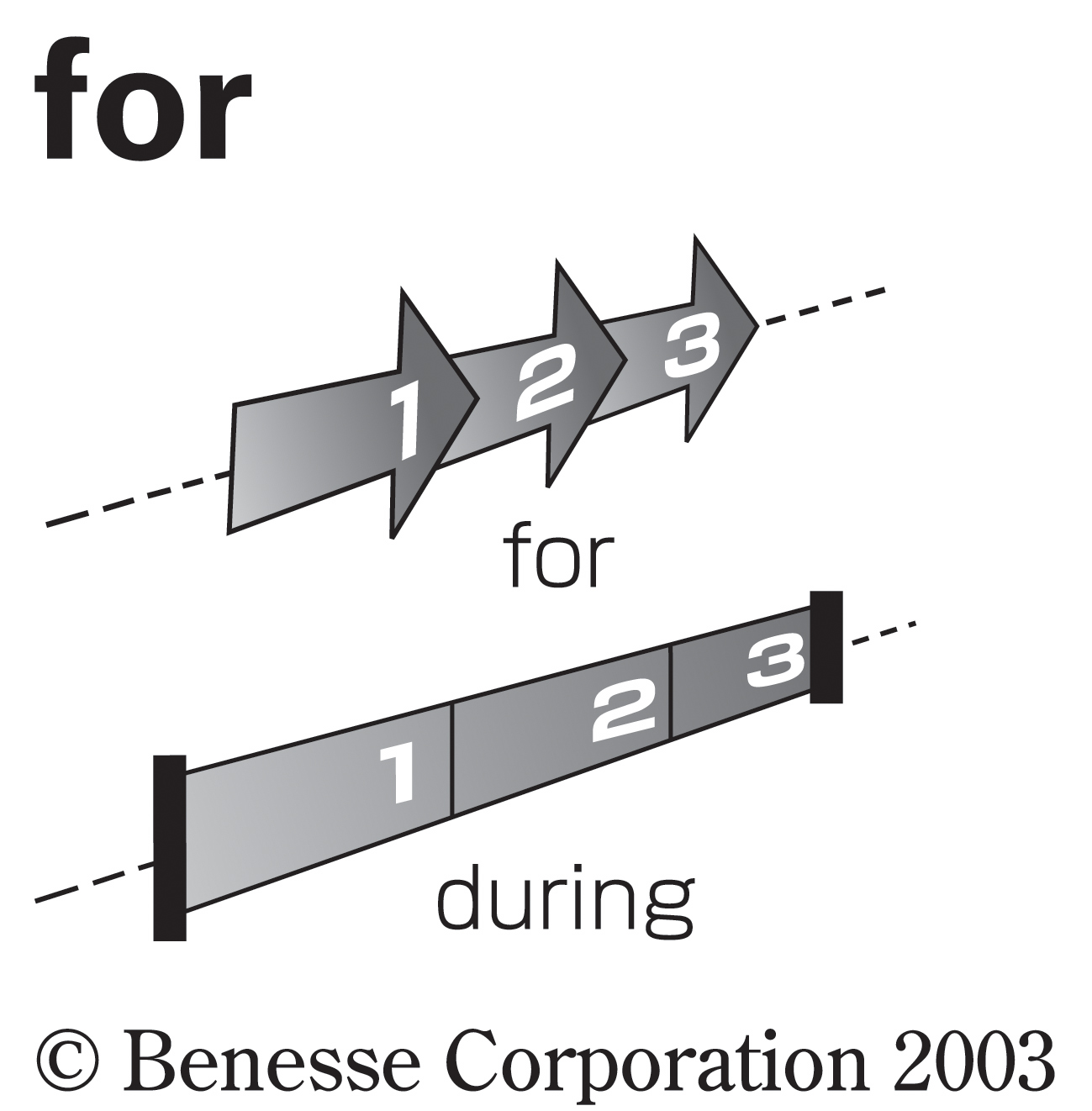| 意味 | 共起表現 |
F.O.Rとは 意味・読み方・使い方
追加できません
(登録数上限)
意味・対訳 …のために、…にとって、…を記念して、…にちなんで、…の名を取って、…に与えるために、…あての、…へ向かって、…へ行くために、…に入場するために
| 覚え方 |

|
…に向かって 向かう方向を強調し,対象を心理的に指差している |
F.O.Rの |
F.O.Rの |
F.O.Rの学習レベル | レベル:1英検:3級以上の単語学校レベル:中学以上の水準TOEIC® L&Rスコア:220点以上の単語 |
Weblio実用英語辞典での「F.O.R」の意味 |
|
for
「for」とは・「for」の意味
for前置詞:~のために、~向けに、~に対して、~の間に、〜については、〜に賛成して
接続詞:なぜなら、というのも
forの用法
前置詞
~のために、~向けに、~に対して、~の間に、〜については、〜に賛成して「for」が前置詞として使われる場合、目的、受益者、方向、期間、意見の支持などを示す。具体的な例を以下に示す。
・例文1. I bought a gift for you.(あなたのためにギフトを買った。)
2. This book is for beginners.(この本は初心者向けだ。)
3. She spoke for all of us.(彼女は私たち全員に代わって話した。)
4. He has been working for three hours.(彼は3時間働いている。)
5. I am for the proposal.(私はその提案に賛成だ。)
接続詞
なぜなら、というのも「for」が接続詞として使われる場合、理由や原因を説明する際に用いられる。具体的な例を以下に示す。
・例文1. I'm happy, for I have passed the exam.(試験に合格したので、私は幸せだ。)
2. He must be tired, for he has been working all day.(彼は一日中働いていたので、疲れているに違いない。)
3. She didn't come, for she was ill.(彼女は病気だったので、来なかった。)
4. We need to leave now, for the train leaves in ten minutes.(列車が10分後に出発するので、今出発する必要がある。)
5. They were all smiling, for they had heard the good news.(彼らはみな、良いニュースを聞いていたので、笑顔だった。)
研究社 新英和中辞典での「F.O.R」の意味 |
|
F.O.R.
for
What did you do that for? 何のためにそんなことをしたのか. He volunteered for the task. 彼はその仕事に志願した. |
The TV station stopped broadcasting for the day. テレビ局は一日の放送を終えた. That's all for today. きょうはこれで終わり. |
a substitute for butter バターの代用品. |
the Member of Parliament for Liverpool リバプール選出の議員. |
⇒be the BETTER1 for…, be the worse for WEAR1 名詞【成句】. |
for that matter そのことで言えば. |
| 語法 |
for.
for‐
産業のほかの用語一覧
Eゲイト英和辞典での「F.O.R」の意味 |
|
for
覚え方…に向かって
 | 向かう方向を強調し,対象を心理的に指差している |
├〔方向〕…に向かって;…にあてて▷1
├〔目的〕…の目的で▷2
├〔利益〕…のために▷3
├〔準備〕…に備えて▷4
├〔支持〕…に賛成して▷5
└〔特定の日時〕…に▷6
Ⅱ時間の流れを指して前置詞
└〔期間〕…の間▷8
Ⅲ関係の対象を指して前置詞
├〔代理〕…の代わりに▷9
├〔交換〕…と引き換えに▷10
├〔適合〕…に適した▷11
└〔割合〕…に対して▷12
Ⅳ判断の観点となる対象を指して前置詞
├〔基準〕…にしては▷13
├〔判断の対象〕…にとって▷14
├〔不定詞の意味上の主語〕…が▷15
├〔理由〕…の理由で▷16
└〔関連〕…については▷17
前置詞
1〔方向〕…に向かって,(乗り物が)…行きで;(電話・手紙・贈り物などが)…にあてて,向けて
2〔目的〕…の目的で,…を得るために,…を求めて
|
3〔利益〕…のために
4〔準備〕…に備えて,…に対して
5〔支持〕…に賛成して,…を支持して(←→against)
6〔特定の日時〕…に;…を祝って
7((米))…の名にちなんで
Ⅱ時間の流れを指して
8〔期間〕…の間
Ⅲ関係の対象を指して
9〔代理〕…の代わりに,…のために;…を代表して;…を表して
10〔交換〕…と引き換えに,…の代わりに;(品物・好意など)に対して
11〔適合〕…に適した,…に向いた;…に(合わせて),…に対する
12〔割合〕…に対して,につき
Ⅳ判断の観点となる対象を指して
13〔基準〕…にしては,…するには;…に対して;…としては
14〔判断の対象〕…にとって
15〔不定詞の意味上の主語〕((for A to do))A(人)が…することは
16〔理由・原因〕…の理由で,…のために,…のせいで
17〔関連〕…については,…としては
接続詞
語法時間の流れを表すfor 時間は流れとして把握され,その流れに沿って動作や行為も進展すると考えられる.for three yearsは「3年という時間の流れ」を指し,I'll study French for the next three years.「これから3年間フランス語を勉強します」には「1年目→2年目→3年目」と時間が流れていく中でフランス語の勉強が進展するという意味が込められている |
ネットワークforとduring 流れている時間ではなく,区切られたある特定の期間を表すような場合にはduringを用いるのがふつう.a period of three yearsは(不特定の)3年という時間の流れを表すためにforで受けることができるが,the period of three yearsは「その3年間」と期間を特定しているためduringを用いる |  |
for.
ハイパー英語辞書での「F.O.R」の意味 |
|
for
| 用例 |
| 印欧語根 | ||
|---|---|---|
| per | 非常に広い意味を持つ印欧語根で、基本的には「前に」「…を経て」を表す前置詞の意味を持つ。その他にin front of, before, early, first, chief, toward, against, near, at, aroundのような広い意味を表す。 主な派生語には、first, from, before, forth, paradise, per-で始まる多くの語(percentなど)、接頭辞pre-を持つ語(preludeなど)、pri-で始まる多くの語(princeなど)、接頭辞pro-を持つ語(propertyなど)などがある。 | |
for-
コンピューター用語辞典での「F.O.R」の意味 |
|
遺伝子名称シソーラスでの「F.O.R」の意味 |
|
FOR
| human | 遺伝子名 | FOR |
| 同義語(エイリアス) | WWOX; WW domain containing oxidoreductase; Fragile site FRA16D oxidoreductase; WWOX v8; WOX1; D16S432E; FRA16D; HHCMA56; WW domain-containing oxidoreductase; PRO0128 | |
| SWISS-PROTのID | SWISS-PROT:Q9NZC7 | |
| EntrezGeneのID | EntrezGene:51741 | |
| その他のDBのID | HGNC:12799 |
本文中に表示されているデータベースの説明
Wiktionary英語版での「F.O.R」の意味 |
FOR
固有名詞
FOR
- Initialism of Fellowship of Reconciliation, any of a number of religious nonviolent organizations, particularly in English-speaking countries.
Weblio例文辞書での「F.O.R」に類似した例文 |
|
| 意味 | 共起表現 |
|
|
F.O.Rのページの著作権
英和辞典
情報提供元は
参加元一覧
にて確認できます。
| Copyright (c) 1995-2024 Kenkyusha Co., Ltd. All rights reserved. | |
| Copyright © Benesse Holdings, Inc. All rights reserved. | |
| © 2000 - 2024 Hyper Dictionary, All rights reserved | |
| Copyright (C) 1994- Nichigai Associates, Inc., All rights reserved. | |
| Copyright (C) 1994- Nichigai Associates, Inc., All rights reserved. | |
| All Rights Reserved, Copyright © Japan Science and Technology Agency | |
| Copyright © 2024 CJKI. All Rights Reserved | |
| DBCLS Home Page by DBCLS is licensed under a Creative Commons 表示 2.1 日本 License. | |
|
Copyright (C) 1994- Nichigai Associates, Inc., All rights reserved. 「斎藤和英大辞典」斎藤秀三郎著、日外アソシエーツ辞書編集部編 |
|
|
Text is available under Creative Commons Attribution-ShareAlike (CC-BY-SA) and/or GNU Free Documentation License (GFDL). Weblio英和・和英辞典に掲載されている「Wiktionary英語版」の記事は、WiktionaryのFOR (改訂履歴)の記事を複製、再配布したものにあたり、Creative Commons Attribution-ShareAlike (CC-BY-SA)もしくはGNU Free Documentation Licenseというライセンスの下で提供されています。 |
|
| CMUdict | CMUdict is Copyright (C) 1993-2008 by Carnegie Mellon University. |
ピン留めアイコンをクリックすると単語とその意味を画面の右側に残しておくことができます。 |
|
ログイン |
Weblio会員(無料)になると
|
weblioのその他のサービス
|
ログイン |
Weblio会員(無料)になると
|
